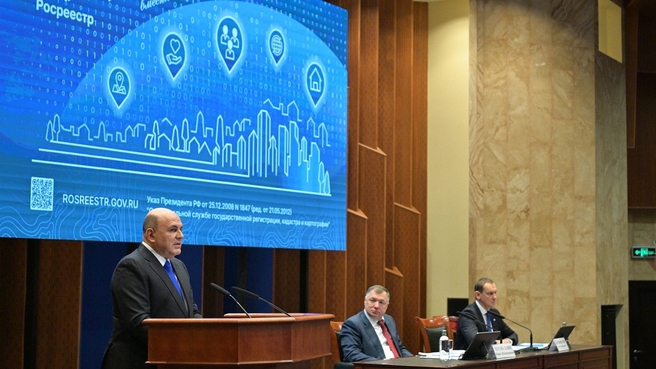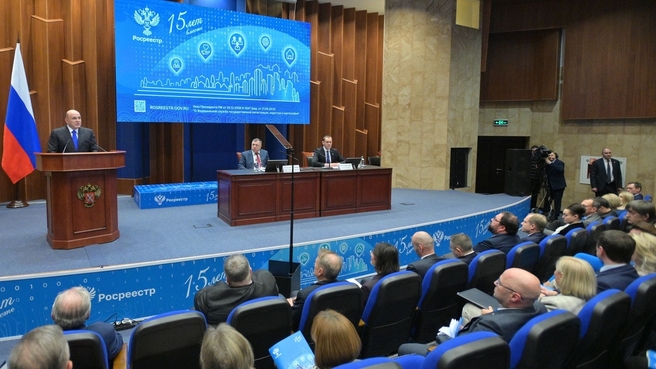RUSSIA, December 13 - During his visit to Rosreestr, the Prime Minister learned about geodesy and cartography projects and addressed a board meeting held to mark the agency’s 15th anniversary.
Mikhail Mishustin’s remarks:
Mikhail Mishustin addresses a Federal Service for State Registration, Cadastre and Cartography Board meeting
Good afternoon, friends,
I am glad to offer my greetings to all of you as we approach a memorable date, the 15th anniversary of the Federal Service for State Registration, Cadastre and Cartography.
Your agency plays an instrumental role in terms of national development. It stands on the crossroads of social and economic affairs. Its primary mission consists of guaranteeing property rights, covering residential buildings, secondary country residences, garages, and land plots. Therefore, it provides for the functioning of one of the core market institutions in our country.
It is thanks to you that all kinds of economic sectors can do their job, which includes agricultural production, the construction industry and manufacturing. Our regions are pursuing their development agendas. They have the potential to attract investors and set up manufacturing, and research and trade platforms by offering quality goods and services to our people.
Of course, we must look beyond this 15th anniversary, and you understand this very well. Your history must be counted in triple rather than double digits. After all, land inventory management has been institutionalised for centuries, no matter what the country was called, the Russian Federation, the Soviet Union, the Russian Empire, and even before that – it always needed the authorities in this sphere to gather these data. It was Catherine the Great who said that parcelling “matters and benefits not only every landowner but the state in general.”
Every era brought its own challenges and imperatives. For the past 15 years, they have mostly dealt with digitising various processes and procedures.
The way land titles used to be registered offers a telling example. You had to start with cadastral registration and then register the title. The whole procedure took about six months and sometimes an entire year, depending on the circumstances. Today, it takes just a few days to a week.
People no longer have to stand in a long queue. Over half of all applications are in the e-format. The majority of mortgage loans are also done electronically.
I would like to cite a few figures. As compared with 2000, the time needed for the registration of rights has been reduced by almost 18 times; for cadastral registration by 15 times and for the delivery of information from the Unified State Register of Real Estate (EGRN) by 10 times.
Sometimes we forget to thank those who stand at the source of this transformation. In this case, it is appropriate to express this. German Gref is here today, and he was the man who initiated these difficult changes with the President’s support.
Let me recall that the law on the state registration of rights to property, and the related transactions (I think it was the 122nd law) was passed in 1998 but it was German Gref who carried out the real reform of the cadastral property system. In 2004, he established the Federal Property Management Agency and the Federal Agency for Cadastral Property. This was a huge step forward.
Much was done to put this proper mechanism into operation. The approaches to work as a whole and the situation in this area were completely changed. Everything became more simple, transparent and convenient. He was the man who launched this important overhaul.
I remember this period with great warmth. In 2004, I headed the Real Estate Cadastre Agency. A land cadastre for modern Russia was compiled at that time. Alexei Overchuk, Svetlana Bondarchuk who is here, and Oleg Skufinsky carried out the massive assessment of property with the use of then modern technology. In this way, they laid a foundation for the development of the Federal Registration Service and spatial data.
All this made it possible to conduct large-scale assessment of all land plots and permanent buildings in a consistent format throughout the country.
Almost four years ago – in January 2020 – the service became directly subordinate to the Government and received the authority to manage land policy.
These were difficult years for the country hit by COVID and the sanctions. We met these challenges with dignity and did our best to save human lives and protect our economy. Despite the outside attempts to deter our progress, the GDP has returned to a trajectory of sustainable growth. The processing industry is rapidly expanding output. People continue buying houses and flats.
The service itself also continued developing. A strategy up to 2030 was drafted. It approved the initiative on the national system of spatial data and adopted a programme of the same name for the first time in its history. The service ensured the drafting and adoption of over 60 federal laws helping people, businesses and authorities to resolve specific problems, such as the summer house and garage amnesty, support for farmers, reduction of the investment-and-construction cycle, and the removal of administrative barriers. This is a powerful package of measures to which your service is directly related.
By the way, when I gave my report in the State Duma, the deputies asked me about my own attitude towards the garage amnesty. Frankly, I said “Of course, I support it.” I lost a garage myself and fully backed this popular decision. Almost 300,000 people have used this mechanism in a short span of time.
More to be posted soon.


